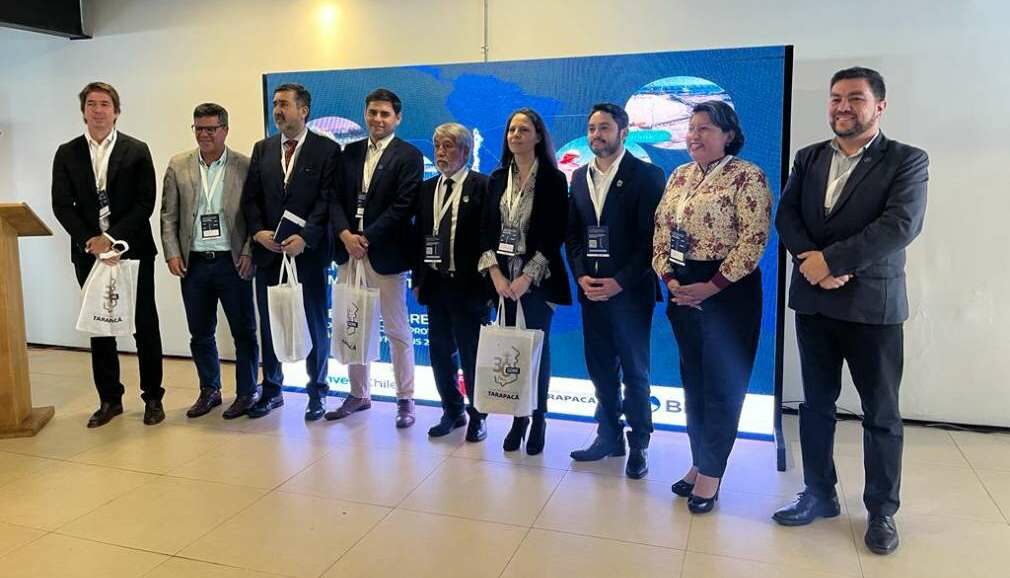
Essential information

IDB and InvestChile present key points for promoting investment and commerce in Chile’s Tarapacá Region

- This Monday, the Inter-American Development Bank presented its report “Fostering Regional Value Chains in Latin America and the Caribbean,” which addresses the economic challenges facing the north of Chile.
This Monday, the Inter-American Development Bank (IDB) presented its report “Fostering Regional Value Chains in Latin America and the Caribbean” in Chile’s Tarapacá Region. The report, which was produced by IDB experts over seven months, aims to recommend public policies to eliminate barriers, improve competitive factors, and develop the necessary infrastructure to strengthen the integration of Chile and its regions in the global business ecosystem. The Tarapacá Region was one of four Chilean regions of focus in the study, which forms part of an initiative covering five economies across the continent.
The event was led by the Regional Governor of Tarapacá, José Miguel Carvajal, together with Carola Moreno, Finance and International Affairs Coordinator at Chile’s Ministry of Finance; María Florencia Attademo-Hirt, IDB’s General Manager of the Southern Cone Department and Representative of the IDB Group in Chile; and Alejandro Riquelme, Head of the InvestChile Strategic Development Unit.
Tarapacá case study
In the specific case of Tarapacá, the IDB study identified the sectors with the greatest development potential in the region, including non-metallic mineral mining (nitrate, iodine, sodium chloride); logistics services, including the logistics chain from ports in the Iquique Free Trade Zone; mining industry services, with a focus on development and operation; and industrial recycling, primarily tires.
Nevertheless, the IDB also detected a series of obstacles whose resolution would streamline business development in these sectors, such as the lack of enabling conditions for non-conventional renewable energy, infrastructure deficit, and water scarcity, among others.
Along these lines, the recommendations delivered by the IDB include the development of a foreign investment attraction campaign for Tarapacá, accelerating and streamlining regulatory procedures, establishing a program for closing labor gaps, implementing a training program for mining industry suppliers, and the development of a plan for the Iquique Free Trade Zone, which would involve modifications to its regulations to enable the establishment of industrial activities and export service providers.
Future efforts
María Florencia Attademo-Hirt, IDB’s General Manager of the Southern Cone Department and Representative of the IDB Group in Chile, highlighted the organization’s work as a strategic partner for promoting trade and investment in the region to conduct an assessment of the opportunities to strengthen both national and regional value chains, with a specific focus on the Tarapacá, Antofagasta, Ñuble, and Biobío regions of Chile.
“With regard to the Tarapacá Region, a significant number of opportunities to promote integration and internationalization have been identified. The main challenges include the development of non-conventional renewable energy, improving infrastructure, tackling water scarcity, boosting management capabilities, and strengthening school education. This assessment enables us to formulate specific proposals to address these challenges in a comprehensive way, which is essential for fostering sustainable development and wellbeing in the region,” said Attademo-Hirt.
In terms of attracting investment to the region, which is one of the recommendations made in the document, Alejandro Riquelme, Head of the InvestChile Strategic Development Unit, noted that the foreign investment promotion agency will continue its direct work with the Regional Government of Tarapacá, incorporating the recommendations made by the IDB study.
“One of the cornerstones of our work at InvestChile is to promote foreign investment not only in the capital city, but also in Chile’s various regions. Foreign investment has a major influence on regional development, increasing the dynamism of business ecosystems by incorporating local SMEs into the supply chain, transferring knowledge and technology, and creating jobs. The arrival of foreign companies in the region can help to reduce the obstacles detected in Tarapacá through the development of renewable energy, infrastructure, and training programs that close labor gaps, for example,” said Riquelme.
The Regional Governor of Tarapacá, José Miguel Carvajal, thanked the IDB for its work and noted that “we’re very enthusiastic about the substantial report of almost 200 pages that we have received, not only because it highlights two of the strongest industries in the Tarapacá Region in which we can generate more competition, but also because it identifies a series of other industries that we have been studying at the Regional Government, especially the textile waste management industry.”
“There is a lot of important and relevant information in this study and, above all, it acknowledges the work we have been doing as a region and the priorities and emphasis that we have established in our development model. Here, we’re talking about public policy, economics, and also a very
important agenda for Tarapacá because, through this initiative, we can create jobs to improve the quality of life for everyone,” concluded Carvajal.







